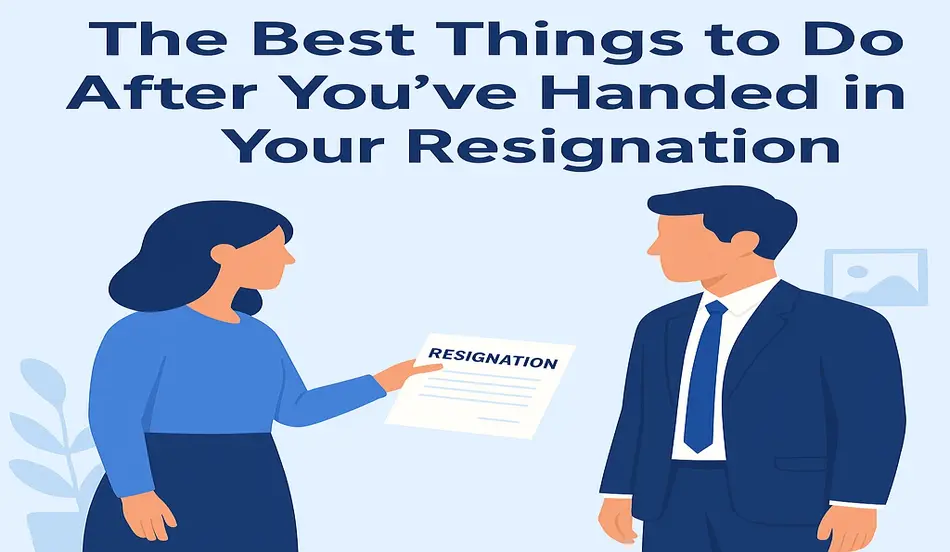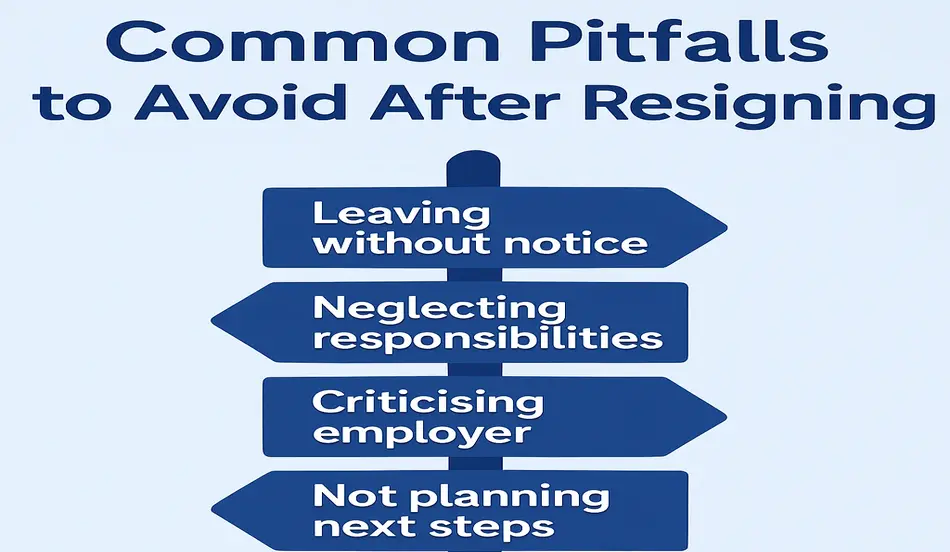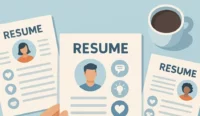Introduction
So, you’ve handed in your resignation. Congratulations! Whether you’re moving on to a new opportunity, taking time off, or making a complete career pivot, this is a pivotal moment in your professional life. But what happens next?
Resigning from a job isn’t just about submitting a letter and walking out the door. What you do after handing in your notice can significantly impact your career, relationships, and even your financial stability. In this guide, we’ll walk you through the best things to do after resigning—with insights tailored specifically for professionals in the UK. From tying up loose ends at your current job to preparing for your next big move, we’ve got it all covered.
Whether you’re wondering what documents to collect after resignation or how to leave without burning bridges, this guide will help you navigate the transition smoothly and strategically.
Table of Contents
Step-by-Step Guide: What to Do After Handing in Your Notice
1. Acknowledge Receipt of Your Resignation
Once you’ve submitted your resignation, ensure your employer acknowledges it formally. This usually comes in the form of a written letter or email confirming your last working day and the terms of your departure. Without this documentation, disputes can arise over notice periods, final pay, or responsibilities.
It’s advisable to keep a copy of your resignation email or letter and the acceptance response for your records. These documents may be helpful if any discrepancies occur later regarding your employment timeline.
2. Understand Your Notice Period
Notice periods vary by employment contract, but UK law stipulates a minimum of one week if you’ve been employed for more than a month. However, many contracts outline longer periods, often one to three months for senior roles.
Understanding this is vital because it influences:
- Your last official day at work
- When your final salary will be paid
- When your benefits and pension contributions end
If you’re unsure about your notice period, consult GOV.UK or speak with your HR team. Also, make sure to clarify if you’re expected to work the entire notice or if there’s a possibility of gardening leave.
3. Prepare a Handover Document
A thorough handover demonstrates professionalism and ensures a smooth transition. This not only helps your replacement but also reflects well on your work ethic.
Essential components of a handover document:
- Detailed list of ongoing tasks and responsibilities
- Project timelines and pending deliverables
- Login details (if allowed)
- Relevant team contacts and client relationships
- Tools and documentation access points
Providing a quality handover can also strengthen your chances of receiving a glowing reference.
4. Schedule Your Exit Interview
An exit interview is standard HR practice. It’s your chance to share your experience, highlight challenges, and express appreciation. Done right, it can be cathartic and insightful for both parties.
Questions to ask in your exit interview include:
- When will I receive my final payslip?
- Will my unused holidays be paid out?
- What is the procedure to get a reference?
- Can I provide feedback anonymously?
These interviews are not just about venting grievances; they can influence how the company improves working conditions for future employees.
5. Request a Written Reference
Before your manager becomes less accessible, formally ask for a written reference. It’s best to receive this while your performance is still top-of-mind. A standard LinkedIn recommendation can also serve as a long-term testimonial of your capabilities.
Make sure your reference:
- Includes your job title and duration
- Highlights key achievements
- Reflects your character and work ethic
This will be valuable when applying for future roles, particularly with firms requiring formal background checks.

6. Review Your Finances
Evaluate how this job transition might impact your finances, especially if there’s a gap before your next employment. Key steps include:
- Reviewing your final salary breakdown
- Understanding entitlements like severance pay or holiday payout
- Budgeting for temporary unemployment
- Reviewing your pension contributions
- Checking if you qualify to claim benefits after resigning (usually only if the resignation was for “good reason”)
Also, assess whether your company has benefits like life insurance or health cover that may lapse after your departure.
7. Leave on a Positive Note
Your last impression matters just as much as your first. Maintain a positive, helpful attitude during your notice period. Express appreciation through farewell messages or emails, and avoid gossip or negative commentary.
You could write a short goodbye message to:
- Thank your team and manager
- Share your personal contact information
- Highlight a few memorable moments
Leaving on good terms strengthens your professional network and can lead to future collaborations or recommendations.
Common Pitfalls to Avoid
1. Burning Bridges
Regardless of your reason for leaving, always part ways respectfully. Avoid bad-mouthing colleagues, managers, or the company—whether verbally or online. You never know who might be a reference or future employer.
2. Neglecting Final Tasks
In the final weeks, there can be a temptation to disengage. Resist this urge. Leaving unfinished work or poor documentation can harm your professional reputation and make it difficult to get a strong reference.
3. Not Getting Written Confirmation
Verbal agreements can be forgotten or misinterpreted. Ensure you have written confirmation of:
- Final pay
- Bonus eligibility
- Unused holiday pay
- Notice period details
4. Misunderstanding Notice Terms
Some employees assume they can leave immediately after resigning. Unless you have an agreement or legal provision, leaving early can breach your contract, potentially resulting in lost pay or legal action.
5. Forgetting Legal Obligations
Post-resignation clauses such as non-compete or confidentiality agreements can limit your immediate job options. Carefully review your contract or seek legal advice if unclear

Illustrative Examples and Case Studies
Case Study 1: Sarah, a Marketing Executive in London
Sarah received a generous counteroffer after resigning. While initially tempted, she consulted with her mentor and realised the new offer wouldn’t address her core dissatisfaction: lack of career progression.
Lesson: If you’re facing a counter offer, think critically. Assess the long-term implications and whether the reasons for resigning can genuinely be addressed.
Case Study 2: David, a Software Developer
David assumed he could ask for a reference later. Months later, his manager had moved abroad and was unreachable. This delay hindered several job applications that required recent references.
Lesson: Always ask for a reference during your notice period. It’s easier for your employer to reflect positively while your contributions are still recent.
Example Scenario: Emma, Admin Assistant
Emma didn’t consider the timing of her final pay. She expected it on the usual schedule but payroll had processed it later due to her exit status. This oversight caused a temporary cash flow issue.
Lesson: Always clarify when your final payslip will be processed and whether any deductions apply.
Case Study 3: Tom, Sales Manager
Tom had a non-compete clause in his contract but ignored it and joined a competitor. His former employer initiated legal action.
Lesson: Review your contract thoroughly to avoid post-employment legal issues.
What It Means for Employers and Management
While resignations can feel disruptive, they also offer important learning and growth opportunities for employers and managers. When a valued team member hands in their notice, it’s not just the employee who goes through a transition—leadership and HR must also navigate a set of strategic and operational challenges.
1. Conduct a Constructive Exit Interview
Rather than viewing exit interviews as formalities, employers should use them as strategic tools. Honest employee feedback can uncover systemic issues, cultural misalignments, or managerial blind spots. Ensure that the exit process is structured to:
- Encourage open and honest feedback
- Maintain a non-defensive tone
- Identify patterns in employee departures
- Propose follow-up actions for improvement
2. Minimise Knowledge Drain
Departing employees often hold critical institutional knowledge. Employers should proactively:
- Request detailed handover documentation
- Set up knowledge transfer meetings with relevant team members
- Record process walkthroughs where appropriate
Encouraging mentorship or buddy systems before an employee leaves can soften the knowledge gap.
3. Preserve Morale and Team Stability
Team members often feel uncertain or demotivated when a colleague leaves. Leaders should:
- Communicate openly about the transition
- Reaffirm the team’s value and direction
- Recognise the departing employee’s contributions in a positive light
Timely and empathetic communication maintains team morale and builds trust in leadership.
4. Review Retention Strategies
Each resignation is a chance to reflect on organisational culture and employee satisfaction. Questions for leadership to consider:
- Was the departure preventable?
- Are similar roles seeing high turnover?
- Are compensation, workload, and growth opportunities competitive?
Regular stay interviews, employee engagement surveys, and market benchmarking can help inform retention strategies.
5. Plan for Future Talent Acquisition
Finally, use the resignation to enhance recruitment and onboarding processes:
- Update job descriptions to reflect evolving needs
- Evaluate internal promotion opportunities
- Create smoother onboarding and ramp-up experiences for new hires
Employers who approach resignations proactively position themselves to emerge stronger and more resilient.
Authoritative External Resources
- GOV.UK – Handing in your notice
- Covers statutory notice periods, final pay rules, and employer obligations.
- ACAS UK – Resignation Advice
- Guidance on rights during and after resignation, handling disputes, and returning company property.
- Citizens Advice
- Extensive details on claiming benefits, holiday pay, and employment rights.
- Prospects UK
- Tips on navigating post-resignation periods and planning career transitions.
Conclusion and Call to Action
Handing in your resignation is just the beginning. What you do next can significantly affect your professional reputation, future opportunities, and financial health.
Let’s recap some of the key actions:
- Get formal confirmation of your resignation and notice period.
- Create a comprehensive handover document.
- Schedule an exit interview and collect a written reference.
- Review your financials and understand your rights regarding pay and benefits.
- Leave on a positive, professional note.
Taking these steps not only protects your current standing but also positions you well for future success.
Want to stay ahead in your career journey? Explore more expert insights at WhatJobs Career Advice, subscribe to our newsletter for regular updates, or contact us for tailored guidance as you navigate your next chapter.
Frequently Asked Questions (FAQs)
What should I do immediately after handing in my resignation?
Inform your manager professionally, confirm your notice period, and begin preparing a handover document. Review your contract to understand your rights and responsibilities during this time. According to GOV.UK, employees must give at least one week’s notice if employed for more than a month.
Do I need to work during my notice period?
Yes, unless agreed otherwise. Most UK contracts require employees to serve their notice or take gardening leave. Leaving early without consent can breach your contract. Always clarify terms with HR or refer to ACAS guidance.
Will I get paid for unused holiday after resigning?
Yes. UK law requires employers to pay for any unused statutory holiday entitlement in your final payslip. This includes holidays accrued during the notice period. Confirm with HR how this will be calculated.
Can I claim benefits after resigning from my job?
You may be eligible for Universal Credit, but resigning voluntarily can delay payments unless you had a “good reason” (e.g., health issues). Citizens Advice provides detailed criteria.






